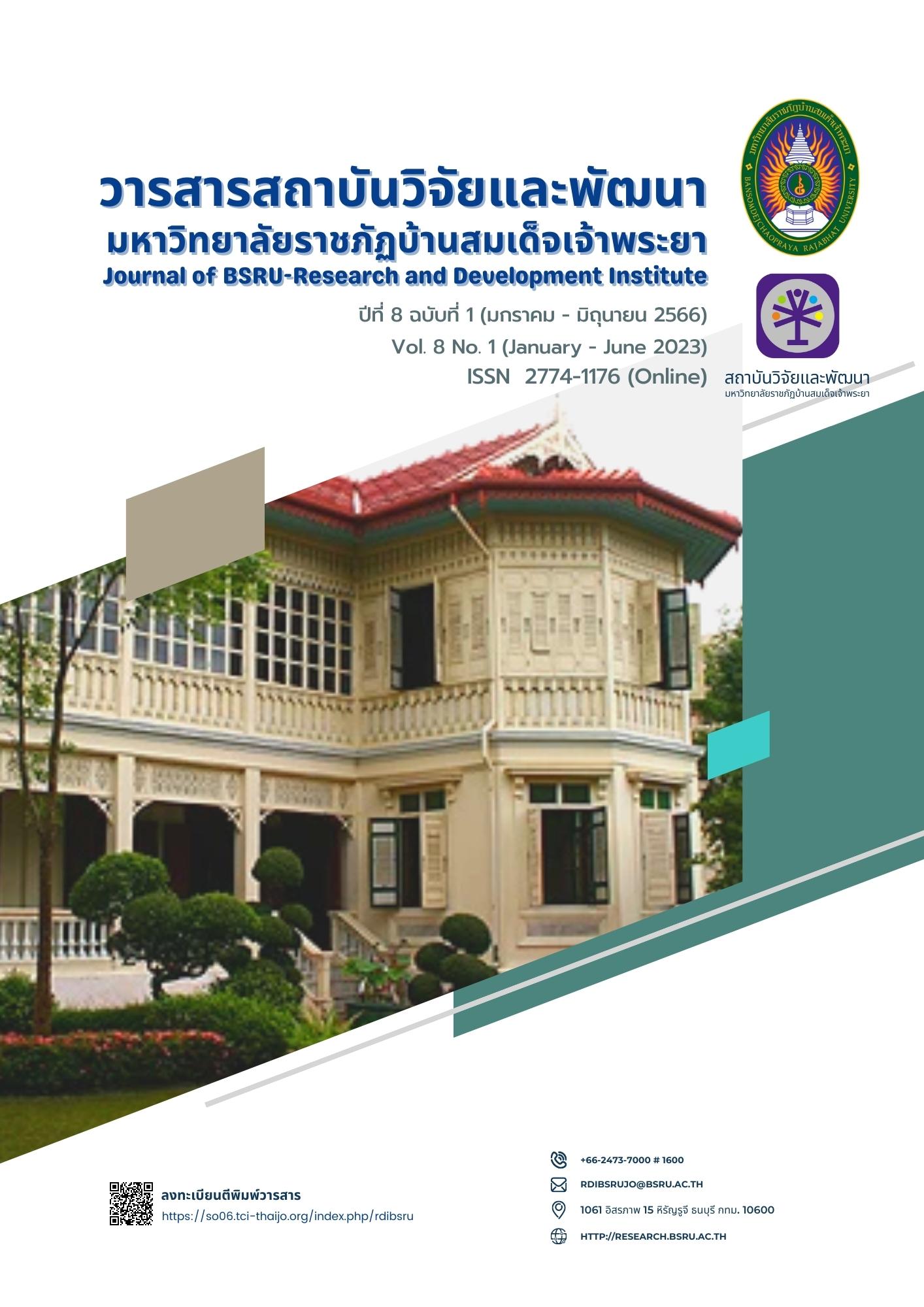AN EXAMINATION OF THE MEDIATING EFFECT OF PSYCHOLOGICAL EMPOWERMENT BETWEEN TRANSFORMATIONAL LEADERSHIP AND ORGANIZATIONAL CITIZENSHIP BEHAVIOR
Keywords:
Transformational Leadership, Psychological Empowerment, Organizational Citizenship Behavior, Structural Equation ModelingAbstract
This study aimed to investigate the mediating effect of psychological empowerment on the causal relationship between transformational leadership and organizational citizenship behavior. A random sample of 305 officers from public and private organizations in Bangkok and the metropolitan region participated in the study. The study utilized electronic questionnaires, including personal data, transformational leadership, psychological empowerment and organizational citizenship behavior scales, as research instruments with high reliability ranging between 0.82 to 0.94. Data was analyzed using frequency, percentage, mean, standard deviation, and structural equation modeling using the Lavan package.
The results indicated that the causal model of the relationship between transformational leadership and organizational citizenship behavior fit the data well (Chi-Square=252, df=202, CFI=0.99, TLI=0.98, RMSEA=0.03, SRMR=0.04). Additionally, transformational leadership had a direct effect on psychological empowerment, which served as a mediator between transformational leadership and organizational citizenship behavior. This suggests that transformational leadership has a fully mediating effect on organizational citizenship behavior through psychological empowerment. The study's findings provide insights into the role of transformational leadership in promoting positive organizational behavior and may inform the development of effective leadership training and development programs.
Downloads
References
Avolio, B. J., and Bass, B. M. (2004). Multifactor leadership questionnaire (MLQ) (3rd ed.). CA: Mind Garden.
Bass, B. M. (1985). Leadership and performance beyond expectations. New York: Free Press.
Bass, B. M., and Riggio, R. E. (2006). Transformational leadership (2nd ed.). NJ: Lawrence Erlbaum Associates.
Boomsma, A., and Hoogland, J. J. (2001). The robustness of LISREL modeling revisited. Structural equation models: Present and future. A Festschrift in honor of Karl Jöreskog, 2(3), 139-168.
Burns, J.M. (1978). Leadership. New York: Harper and Row.
Carless, S. A., Wearing, A. J., and Mann, L. (2000). A short measure of transformational leadership. Journal of business and psychology, 14(3), 389-405.
Hair, J. F., Black, W. C., Babin, B.J., and Anderson, R. E. (2018). Multivariate Data Analysis (8th ed.). London: Cengage.
Henderson, A. A., Foster, G. C., Matthews, R. A., and Zickar, M. J. (2020). A psychometric assessment of OCB: Clarifying the distinction between OCB and CWB and developing a revised OCB measure. Journal of Business and Psychology, 35(6), 697-712.
Kedcham, A. and Sattabut, T. (2022). Causal Relationship between Transformational Leadership, Teamwork and Teacher Job Satisfaction: Multilevel Structural Equation Modeling. Silpakorn Educational Research Journal, 14(1), 203-215. (In Thai).
Organ, D. W. (1988). Organizational citizenship behavior: The good soldier syndrome. London: Lexington books.
Saira, S., Mansoor, S., and Ali, M. (2020). Transformational leadership and employee outcomes: the mediating role of psychological empowerment. Leadership and Organization Development Journal, 42 (1), 130-143.
Samo, A. H., Shaikh, N., Mahar, F., Rizwan, S. I., and Jalil, S. (2022). Beyond The Call Of Duty For Health Practitioners: A Mediation And Moderation Model Of Leadership Styles, LMX, Empowerment And Organizational Citizenship Behavior. Webology, 19(3), 2533-2554.
Schreiber, J. B. (2017). Update to core reporting practices in structural equation modeling. Research in Social and Administrative Pharmacy. 13(3). 634-643.
Soper, D.S. (2021). A-priori Sample Size Calculator for Structural Equation Models. [Software][Online]. Retrieved from https://www.danielsoper.com/statcalc.
Spreitzer, G. M. (1995). Psychological empowerment in the workplace: Dimensions, measurement, and validation. Academy of management Journal, 38(5), 1442-1465.
Wandani, M., and Sunaryo, S. (2022). The Effect of Transformational Leadership on Turnover Intention and Organizational Citizenship Behaviour (OCB): The Mediation Role of Psychological Empowerment and Affective Commitment. International Journal of Economics, Business and Management Research, 6(9), 293-316.
Williams, L. J., & Anderson, S. E. (1991). Job satisfaction and organizational commitment as predictors of organizational citizenship and in-role behaviors. Journal of management, 17(3), 601-617.
Downloads
Published
Issue
Section
License
บทความ ข้อความ ภาพประกอบ และตารางประกอบที่ลงพิมพ์ในวารสารเป็นความคิดเห็นส่วนตัวของผู้นิพนธ์ กองบรรณาธิการไม่จำเป็นต้องเห็นตามเสมอไป และไม่มีส่วนรับผิดชอบใดๆ ถือเป็นความรับผิดชอบของผู้นิพนธ์เพียงผู้เดียว






